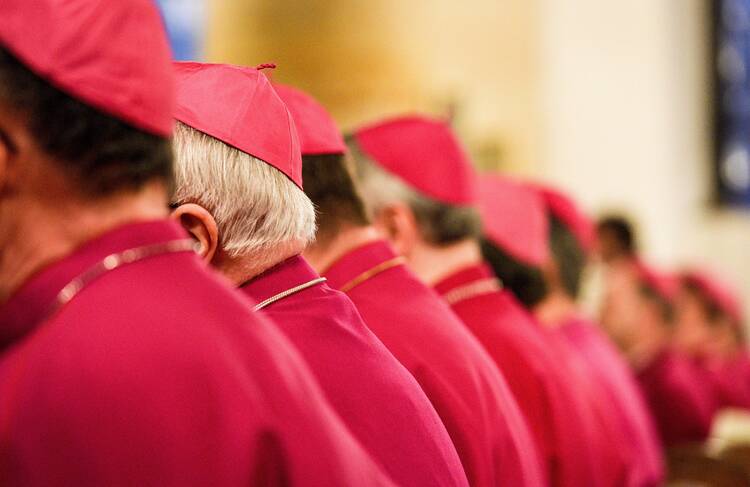WURZBURG, Germany (CNS) — Twenty-seven German bishops — the Permanent Council of the bishops’ conference — will meet Aug. 24, the first time since the Vatican’s instruction on parish reform landed on their desks July 20, triggering furious reactions from some of them.
The German Catholic news agency KNA notes the president of the bishops’ conference has so far been virtually the only bishop not to comment publicly on the document. Bishop Georg Batzing, true to his role as mediator, appears intent on first waiting for the outcome of discussions in Würzburg.
Bishop Batzing’s deputy, Bishop Franz-Josef Bode, was among the first to criticize the instruction, calling it a “strong brake on the motivation and the appreciation of the services of laypeople.”
He said he would have expected Rome to make itself more familiar with the realities of local parish life on the ground before issuing the statement. If the Vatican was excluding laypeople from the management of parishes and emphasizing the role of priests to such an extent, it was carrying out a “reversal toward clericalization,” he said, adding that the norms outlined in the instruction had largely been overtaken by reality.
Bishop Batzing’s predecessor, Cardinal Reinhard Marx, criticized the style of the instruction, KNA notes.
“It is a little strange for a document to come from Rome without any talks taking place with us,” he said. The coexistence of universal and local churches should not work in that way, he said, adding that the instruction had sown distrust and deepened rifts.
While the document does not introduce new legislation on pastoral care, the Vatican press office said it was developed by the congregation as a guide related “to the various projects of reform of parish communities and diocesan restructuring, already underway or in the planning process.” It also clarifies the role of the deacons, consecrated men and women, as well as the laity, in dioceses where there is a shortage or lack of priests.
Mainz Bishop Peter Kohlgraf said he could “not simply accept” what he described as an “interference” in his episcopal office. The instruction left him worried about “the many (Catholics) who are (still) committed.” He stressed: “Soon they will have enough if their commitment is only suspiciously watched and evaluated from on high.”
He added that he was worried about the priests. The reforms were intended to ease their burden and not to take anything away from them. “Many priests complain that they are overwhelmed by the administration and bureaucracy.”
Archbishop Ludwig Schick of Bamberg said the instruction did “more harm than good.” It was theologically deficient, neglected new developments and failed to address the situation of the church on the ground.
Bishops Stephan Ackermann of Trier and Franz-Josef Overbeck of Essen complained that the instruction made no mention of the abuse cases and the clerical abuse of power.
“How can a congregation that is responsible for the clergy compose a document in 2020 that doesn’t even make reference to that?” Bishop Ackermann asked.
Bishop Overbeck said that, given the shortage of priests, he saw no alternative to the current reforms.
“What the document demands is de facto not realizable because there are no priests around who, in terms of numbers, would be necessary to handle all the requirements,” he said.
Bishop Gerhard Feige of Magdeburg said: “I won’t let myself be paralyzed and blocked by their restrictive orders, since much in it is quite unrealistic.” He added that the paper showed no “positive solutions in view of the mounting lack of priests.”
Many bishops insisted that they intended to stick to their planned reforms involving the intensive cooperation of laypeople.
“Of course I respect these guidelines from the Vatican,” said Bishop Stephan Burger of Freiburg. “But we must also take account of the developments and the realities in our country.”
But alongside the unusually forthright criticism from some bishops there were other voices. Cologne Cardinal Rainer Maria Woelki was the first to praise the instruction issued by the Vatican Congregation for Clergy, of which he is the only German member.
He said it contained many suggestions for a missionary awakening of the church: “At the same time, it reminds us of the basic truths of our faith, which we here in Germany perhaps have lost sight of.”
Bishop Wolfgang Ipolt of Gorlitz said he could not detect any suggestions of priestly “dictatorship” in the letter, which said the priest should work with the various parish bodies.
Passau Bishop Stefan Oster warned against taking the wrong view of power and authority. Modern leadership meant team leadership, he said. But he also praised the paper for providing guidelines for a missionary church.
One of the latest reactions came from Regensburg Bishop Rudolf Voderholzer, who said it was “self-evident” that final authority in a parish could only lie with the priest. But the priest was dependent on good cooperation with laypeople, he added. Bishop Voderholzer said the church was not a “quasi democracy.”
A further, rather unusual reaction came from Rome: an offer to meet the German bishops for talks. The Vatican Congregation for the Clergy would be happy to speak with the bishops to remove their doubt and astonishment, the head of the office, Cardinal Beniamino Stella, told KNA.










